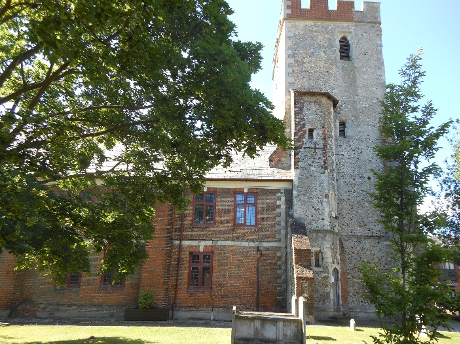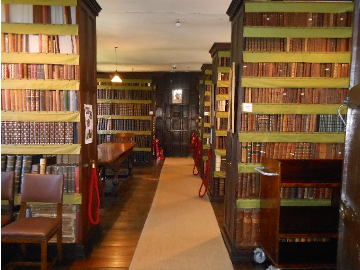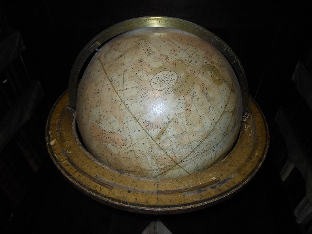
We are delighted that Dr Helen Kemp has been awarded the scholarship for Beginning Bibliography this year. Helen is the Librarian of ILA member Thomas Plume’s Library.
She is also a Community Fellow in the Department of History at The University of Essex, Special Collections Champion at the Albert Sloman Library, and Maddock Research Fellow 2019-2020 at Marsh’s Library, Dublin.
Thomas Plume’s Library, in Maldon, Essex, was founded in 1704, and holds over 8,000 early printed books and pamphlets. Helen writes,
After carefully making your way up the steep, spiral stone staircase and emerging into the Tower Room of the old medieval church of St Peter, you will see the entrance to Thomas Plume’s Library. Inside the creaky old wooden door lies a treasure trove of books and manuscripts from the 15th century to the present day, housed in Plume’s purpose-built extension to the church tower.

Although he came from a Presbyterian background, and received his living from Richard Cromwell, Plume supported the Royalist cause and established church. During the interregnum Hacket sent Plume into London to buy books, and perhaps this was when Plume started collecting for himself, or at least when he learned about the process.By the time he was archdeacon of Rochester in 1679 it is likely that Plume had amassed a large part of the Library, which he left to the town of Maldon on his death in 1704.
(Image: Thomas Plume’s portrait, which hangs in The Moot Hall, Maldon. Picture credit: Maldon Town Council).
The Library Collections

Dr Plume left to his Library an incredibly large collection of books for someone of his status, together with his paintings, manuscript notebooks and papers.
Many of his books were on theological topics – as you might expect, and this was usual for many libraries – but Plume was also fascinated by the ‘new sciences’ and natural history and these books on these subjects form a significant proportion of the collection.
John Flamsteed, the first astronomer royal, was Plume’s friend and neighbour in Greenwich and Plume watched the Greenwich observatory being built. He decided to leave a bequest for an observatory and professorship of astronomy and experimental philosophy to the University of Cambridge. Flamsteed, along with Isaac Newton and others, was to supervise this bequest.
Since Plume’s collections came to the Library in 1704, we have received donations of books published from the 17th century to the present day. Our Post-Plume collection contains some amazing items, including early books of music, science, and law; Romantic poetry; world antiquities and local history.
Although Dr Plume left his library for the benefit of Maldon’s gentlemen and scholars, today we meet two different types of visitor:
- researchers who come to examine the books; and
- members of the public who are interested in heritage and come to see the Library as a “museum” of early modern intellectual culture.

Displayed on the panelled walls, and ends of some of the bays, are Plume’s collection of paintings – mostly portraits of monarchs and 17th century divines. The handsome celestial globe can also be admired, but not spun! It was one of a pair made in the early 19th century to replace the worn-out originals.
The ideal Library Keeper was described by Plume in his will as a scholar who knew books, and one who had taken holy orders. The early Library Keepers often doubled-up as local vicars, but more recently those employed as “Plume Librarian” have followed different professions – a couple have been qualified librarians, but others trained as archivists or teachers, and some – like me – as historians.
Coming from different professional backgrounds – but united by our interest in early modern books – Plume Librarians have always responded to the current needs of the Library by using their own skill sets. My predecessor, for example, who came from an archives background, took on the huge project of cataloguing and conserving the archives of the Plume Trust from the 18th and 19th centuries.
Being fairly new to the role, I have two main priorities at the moment:
- making a full inventory of the books, to include identifying their condition and unique features to improve the catalogue and assess conservation needs; and
- raising funds and project-managing our urgent building improvements.
In recent years, the lathe and plaster ceiling has grown some large cracks and needs to be replaced, which will mean the whole collection will need to be removed and stored for the duration. We have been lucky to secure some institutional funding and our “Sponsor-a-Shelf Scheme” has been very successful in attracting donations from the Friends, local residents, organisations, and businesses.
The Friends of Thomas Plume’s Library was formed when a few people came together to buy a book in a New York auction which contained the Library’s inscription. Around 700 books had gone missing in the early 20th century and the Friends have since bought replacement editions (and in a very few cases they have found original copies). Assistant Librarian Paula Thomson is currently curating an exhibition of some of these replacement books. We are welcoming visitors on an appointment only basis: please see details on our website.
I am indebted to Anne Welsh for donating the ILA Scholarship on Beginning Bibliography and to The Independent Libraries Association for choosing me as the recipient. I am enjoying the course immensely and can see how it will help me in my endeavour to provide proper and full catalogue descriptions of format and collation in conjunction with my inventory.
We, in turn, are very grateful to the committee of the Independent Libraries Association for administering this award, and especially to its Chairwoman, Emma Marigliano, who undertook the difficult task of selecting the recipient. She said, “I think Helen will make immediate and necessary use of the skills she will learn.” Both ILA and Beginning Cataloguing would like to encourage the other applicants to apply again in future years, and / or for scholarships to other courses. We also hope that Helen will enjoy Beginning Bibliography and that it helps her increase her knowledge of bibliographic description and research methods.